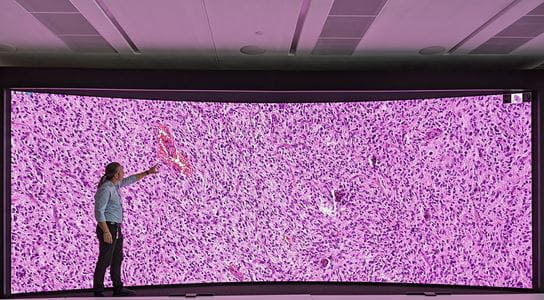The Indiana University School of Medicine Department of Pathology and Laboratory Medicine is hosting the annual meeting of the National Institutes of Health/National Cancer Institute program for Informatics Technology for Cancer Research (ITCR). The conference will be held Sept. 16-19 in Indianapolis.
ITCR aims to promote interdisciplinary collaboration in technology development and dissemination, leveraging the expertise of IT professionals and cancer researchers throughout the nation. Representatives from 75 institutions will be in attendance, and many will share findings from their NCI-funded research projects exploring emerging technology tools for early cancer detection, risk assessment, diagnosis and treatment.
“All areas of computational cancer research are discussed in this meeting,” said IU School of Medicine’s Spyridon Bakas, PhD, who made the bid for IU to host the conference. Bakas is the director of the school’s newly launched Division of Computational Pathology and of the Research Center for Federated Learning in Medicine. He has been funded by the ITCR since 2017.
Kun Huang, PhD, chair of the Department of Biostatistics and Health Data Science at the IU School of Medicine, will open the annual meeting. Huang and Bakas are among five IU School of Medicine researchers with grants from the ITCR, including Travis Johnson, PhD; Jie Zhang, PhD; and Yong Zang, PhD.
Recently, Bakas received a $3.7 million grant for a collaborative study using artificial intelligence to improve breast cancer risk prediction. The unique AI training model benefits from a large data set from multiple institutions while protecting sensitive health data through a system known as federated learning.
Michael Feldman, MD, PhD, the Manwaring Professor and chair of the Department of Pathology and Laboratory Medicine at the IU School of Medicine, is one of three keynote speakers for the ITCR’s 2024 conference. Feldman’s professional interests revolve around the development of institutional biobanking, along with the integration of information technologies into pathology and other areas of medicine. He is a member of the IU Melvin and Bren Simon Comprehensive Cancer Center, which is co-sponsoring the annual meeting. Feldman is currently developing computer-assisted diagnostic algorithms for breast cancer and has been working in the field of digital and computational pathology for the past 25 years.
Other keynote speakers for the annual conference are Debra JH Mathews, PhD, MA, associate director for research and programs for the Johns Hopkins Berman Institute of Bioethics and a professor of genetic medicine at Johns Hopkins University School of Medicine, who will discuss regulatory affairs; and Peter Mattson, PhD, president of the board of the MLCommons Association, board member at the AI Verify Foundation and a senior staff engineer at Google, who will discuss dissemination of AI models in health care.
“I am honored to have Indiana University School of Medicine selected to host the annual meeting of the National Cancer Institute’s ITCR,” Bakas said. “There will be about 90 presentations of projects focusing on all sorts of different cancers and different domains. There are projects focusing on how to analyze molecular characteristics and projects focusing on computational pathology and computational radiology, and even on large language models, like ChatGPT, and their applications on electronic health records — every area of computational cancer research will be discussed.”
